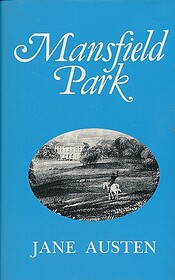Guild Publishing, 1981, 459 p. First published 1814.
Well, this started out well enough: with one of those pithy Austenisms on page one, “But there certainly are not so many men of large fortune in the world, as there are pretty women to deserve them,” but I think it is safe to say that had Austen’s literary reputation rested on Mansfield Park alone it would not be so high as is usually asserted. The main man of large fortune here is Sir Thomas Bertram (owner of a plantation in Antigua) who married a Miss Maria Ward of Huntingdon. Her two sisters married less well, one to Rev Mr Norris, who then was able to secure the living in the gift of his brother-in-law and was therefore reasonably situated financially, but the other “disobliged” her family by marrying a Lieutenant of Marines without education, fortune or connections and so ensured a breach with her sisters.
The Rev Norris having died, his wife moved into Mansfield Park – and fancied herself as running the place. She took it into her head one day to relieve her poorer sister of the care of one of her children and, with the assent of Sir Thomas and Lady Bertram, Fanny Price came to stay at Mansfield Park. There she is treated very much as the poor relation, receiving her cousins’ cast-off toys, the room she is given to use having no fire laid, and treated as a dogsbody by Mrs Norris – though less so by Lady Bertram – a dogsbody who should nevertheless be grateful for her condition. Sir Thomas she finds scary and aloof. The only one of the family who treats her with any consideration is the younger Bertram son, Edmond. The older son, Tom, is a bit of a wastrel (as was the wont of older sons with the prospect of inheritance.) Mrs Norris is always complaining about Fanny’s habits and supposed deficiencies and similarly misguidedly sagacious-seeming about what is right and proper. We all know a Mrs Norris. The local clerical living has been taken over by a Rev Grant whose wife’s sister and brother, Henry and Mary Crawford, come to stay and so enter the social circle of Mansfield Park.
Sir Thomas’s fortunes go up and down and he is forced to make a voyage to Antigua. In his absence the Bertram children and their friends hit on the idea of putting on a play. There follow several utterly tedious chapters on which play should be chosen (one called Lovers’ Vows is eventually selected,) who should play whom, and what alterations to the house are required to stage it. Fanny is mostly a bystander in all this but agrees to help with rehearsals.
Okay, this all has a plot function since it illustrates Henry Crawford as not to be trusted – he uses his part to try to suborn Fanny’s elder female cousin, by now engaged to the wealthy (but dull) Mr Rushworth, away from her fiancé – and so forms Fanny’s opinion of him. At the same time she has become friends of a sort to Mary Crawford. In one of their conversations there appears another Austenism as Mary tells her, “there is not one in a hundred of either sex, who is not taken in when they marry …… it is, of all transactions, the one in which people expect most from others, and are least honest themselves.”
The play is destined never to be performed as Sir Thomas’s early return – and high disapproval – puts an end to it. Henry Crawford later sets his sights on Fanny, whose refusal of his proposal mystifies all and sundry. A return to her family in Portsmouth for a period of reflection is settled on and while she is there the later unfoldings of the plot take place, off-stage in London.
As a novel this has severe limitations. Fanny is not a very active protagonist, almost an absence in fact. She has to be self-effacing due to her station in life but as a result becomes all but invisible as a character. The omniscient third person narrator (who only twice interpolates an “I” into the text as a sort of commentary on what we are being told) more often relates events and characteristics rather than illustrating them. This may though be to attribute twenty-first century expectations of a novel on to one two hundred years old. The whole is of course as long-winded and circumlocutious as any other early nineteenth century novel but that cannot really be held against it.
From a modern perspective it is signal that the text directly mentions slavery only once, but that institution was of course the foundation of all that the denizens of houses like Mansfield Park, and their frivolous pursuits, depended on. It was not Austen’s main focus in any case, which as is customary were the vagaries of the marriage market and the gradations of social class. The sections set in Portsmouth do bring out the contrast between the hustle and bustle of life in more constrained circumstances and that in a supposedly sedate house like Mansfield Park.
Pedant’s corner:- Some Austenish spellings – everybody, everywhere, everything, anybody, nowhere, anywhere, background, akin, are all written as two words – staid (stayed,) stopt (stopped,) stampt (stamped,) chuse (choose, but ‘choose’ itself did appear once,) headach (headache; though ache itself was spelled in the usual manner, as was heart-ache, albeit with the hyphen,) buz (buzz,) cruize (cruise,) birth (berth,) or early nineteenth century usages, fulness (fullness,) intreat (entreat,) cloathe (clothe,) sunk (sank,) sprung (sprang,) shrunk (shrank,) etc. Otherwise; “the Miss Bertrams” (the Misses Bertram,) “the Miss Bertrams’” (the Misses Bertram’s,) “the Mr Bertrams (the Mrs Bertrams would be misconstrued; so ‘the Misters Bertram,’ or ‘the Messrs Bertram,’) “the two Miss Sneyds” (the two Misses Sneyd,) “the Miss Maddoxes” (the Misses Maddox.) “‘How many Miss Owens are there?’” (Misses Owen.) “Mrs Grant has has been” (only one ‘has’.) Mr Yates’ (Mr Yates’s,) Beachey Head (Beachy Head,) “a last look at the five or six determined couple” (couples,) some commas missing before pieces of direct speech. “‘- So many months acquaintance’” (months’ acquaintance,) “to stay dinner” (to stay to dinner,) similies (similes,) “by the bye” (later expressed as ‘by the by’, which I prefer anyway,) “‘I did not use to think’” (did not used to think,) “better that Maria” ( better than,) “heir apparents” (heirs apparent.)








